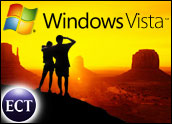
It may be months before Windows Vista, the long-anticipated upgrade ofMicrosoft’s PC operating platform, becomes widely available, but the company is already taking heat for building in technology that limits its transferability.Users will be able to transfer Vista from the first PC installation to a different machine only once.
Earlier versions of the operating system, including Windows XP, gave users more freedom to transfer their preloaded software to other machines. Under the terms of the license agreement, the software always had to be removed from one machine before it could be used again, but there was no explicit limit to how many times that procedure could be carried out.
Microsoft said the change better reflects the life expectancy of contemporary PCs, with a single user unlikely to need to replace their machines more than once during the lifecycle of the operating system. Microsoft has not laid out a schedule for what will come after Vista, but if past practice is followed, it will probably begin rolling out a next-generation option after about five years.
Some critics of the limit on transferability say it overlooks the needs of power users who regularly upgrade their personal computers to take advantage of new technology, faster CPUs, larger hard drives and other advances in computing. For those users — many of whom buy stripped-down PCs without preloaded software — having to purchase additional Vista licenses could be a significant expense.
More Changes Noted
Some bloggers have been quick to hit Microsoft on the new provision, saying it would be a blow to computer enthusiasts who switch out major components in their PCs. The installation of a new motherboard, for instance, may render a machine “new” for purposes of reloading Vista. Others speculated the change may not prevent piracy as intended because pirated versions would soon be developed with the restrictions removed.
Others said the terms were not much different from earlier licensing restrictions, and that the major changes in the upcoming technology have to do with their automatic enforcement.
Microsoft also said it was limiting how the OS could be used as a virtual operating system. Only the Vista Ultimate high-end personal version and the Vista Business corporate edition will be capable of being run in virtual settings, Microsoft said.
Vista will also have stronger anti-piracy features, including a requirement to authenticate the software by keying in a license number within 30 days of activation. The Software Protection Platform will shut down a PC until a valid license number is provided.
Microsoft has long battled costly piracy of its products, with millions in lost revenues each year due to the proliferation of unauthorized copies of its software, as well as the more common practice of software use being extended beyond its original intended purpose.
The details of the Vista licensing framework are emerging as Microsoft gets ready to ship the software, with PC makers and others starting to receive it within a matter of weeks. Retail availability for consumers is still set for early 2007.
Powering Down
Microsoft is also touting Vista as a potential energy-saving tool for large businesses. The OS will feature an automatic feature that will power down a machine that is not being used.
In large enterprise settings where thousands of PCs are connected to networks, the annual energy savings could be substantial, the company says. The default setting will shut down PCs after an hour of inactivity, though the feature can be modified to allow for longer periods of time.
Microsoft said a single PC being turned off during down hours could save as much as US$55 to $70 per year, savings that can quickly multiply in large deployments.
The software giant has ramped up promotion of Vista in recent weeks, after announcing that it would go ahead with a worldwide launch despite antitrust concerns in some markets, including Europe and South Korea. Microsoft said it had made some adjustments to Vista that it believes will avoid further regulatory trouble in those jurisdictions.
“The task ahead of Microsoft now is to generate interest in an upgrade that has been in the planning stages for so long that people may have become complacent,” said Enderle Group Principal Analyst Rob Enderle. “They have tried to keep potential customers on the edge of their seats for a long time, and now is the time to get them ready to buy.”




















































